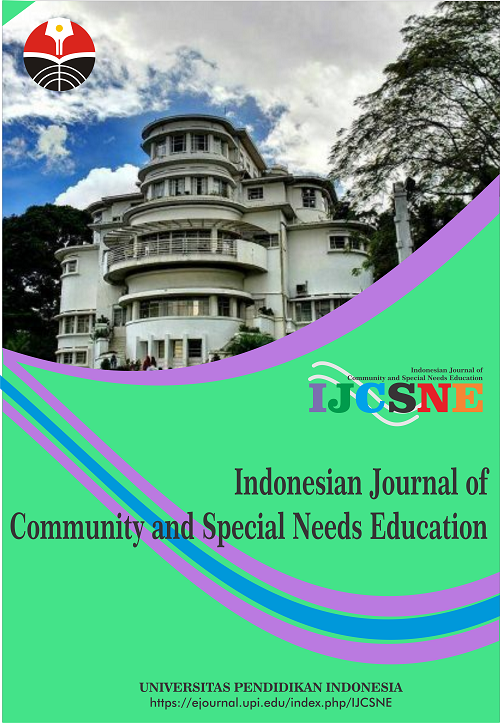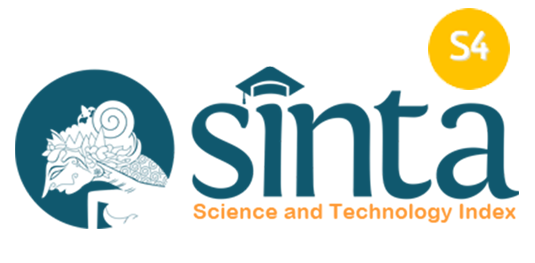Protecting Children’s Rights through Inclusive Schools for Students with Special Needs: Legal and Phenomenological Perspectives
Abstract
Inclusive education is a constitutional mandate under Article 31 of the 1945 Constitution, guaranteeing the right to equitable and quality education for all citizens, including children with special needs. However, implementation in Indonesia faces persistent challenges, such as limited availability of inclusive schools, inadequate facilities, insufficiently trained teachers, and curriculum designs that fail to accommodate diverse needs. This study employs a literature review using legal and phenomenological approaches to examine the implementation of inclusive education, referencing Law No. 8 of 2016 on Persons with Disabilities and Ministry of Education Regulation No. 48 of 2023 on Appropriate Accommodations. Findings reveal that stigma, discrimination, and ineffective policy enforcement remain major barriers. Recommendations include enhancing teacher competencies, improving infrastructure, and fostering a cultural shift toward inclusion. Strengthening these aspects is essential for inclusive schools to realize the rights and potential of children with special needs in an equitable educational environment.
Keywords
Full Text:
PDFReferences
Adesokan, A., and Bojuwoye, O. (2023). Teachers’ perceived barriers to inclusive education. ASEAN Journal of Community and Special Needs Education, 2(2), 91-96.
Agarry, R.O. (2022). An evaluation of early childhood educators’ knowledge of their professional code of conduct. Indonesian Journal of Multidiciplinary Research, 2(2), 401-408.
Aguh, J.C., and Olutola, A.T. (2023). Examining the challenges of early childhood education in Nigeria. Indonesian Journal of Educational Research and Technology, 3(2), 91-96.
Ainscow, M., and Miles, S. (2008). Making education for all inclusive: Where next?. Prospects, 38(1), 15-34.
Ainscow, M., and Miles, S. (2008). Making education for all inclusive: Where next?. Prospects, 38(1), 15-34.
Albion, L., Kaira, M.R., Tawami, T., Fairuz, D.A., and Maulana, H. (2021). Designing English education game application for early childhood. ASEAN Journal of Science and Engineering Education, 1(2), 117-124.
Al Shaban Radi, H.M., and Hanafi, Z. (2024). Managing visually impaired students: Factors that support and inhibit inclusive programs in elementary. Indonesian Journal of Community and Special Needs Education, 4(1), 19-28.
Anggreni, N. M. D. A., dan Valentina, T. D. (2015). Penyesuaian psikologis orangtua dengan anak down syndrome. Jurnal Psikologi Udayana, 2(2), 185-197.
Azizah, N., Prasetyo, A.C., Dini, N., Wulandari, V., and Kruesa, M. (2022). Social inclusive education project (SIEP) as a community for handling children with special needs in rural areas. Indonesian Journal of Community and Special Needs Education, 2(2), 89-98.
Baxtiyor, A.S., and Sardor, E.D. (2024). Transforming special and inclusive education: Leveraging information technologies for enhanced learning. ASEAN Journal of Community and Special Needs Education, 3(2), 95-104.
Cabatay, M. M., and Gonzales, H. B. (2024). Disaster prevention and risk reduction education implementation in special education schools in Indonesia: Teachers’ challenges, strategies, and recommendations’. Jurnal Pendidikan Sains Indonesia, 12(1), 216-231.
Chrzanowska, I. (2023). Educational space in inclusive education–challenges in working with a diverse group/class. Lubelski Rocznik Pedagogiczny, 42(4), 59-75.
Damayanti, D., dan Rismaningtyas, F. (2021). Pendidikan berbasis responsif gender sebagai upaya meruntuhkan segregasi gender. Jurnal Analisa Sosiologi, 10, 60-75.
Darma, I. P., dan Rusyidi, B. (2015). Pelaksanaan sekolah inklusi di Indonesia. Prosiding penelitian dan pengabdian kepada masyarakat, 2(2), 223-227.
Faddillah, R.N., Nandiyanto, A.B.D., and Bilad, M.R. (2022). Literacy program for elementary school students about inclusive education in recognizing children with special needs. ASEAN Journal of Community and Special Needs Education, 1(1), 1-8.
Fahrul, A., dan Ahmad, M. R. S. (2023). Diskriminasi pendidikan (studi kasus pada anak berkebutuhan khusus di kabupaten kepulauan selayar). Jurnal Sosialisasi: Jurnal Hasil Pemikiran, Penelitian dan Pengembangan Keilmuan Sosiologi Pendidikan, 1(1), 121-132.
Fatmawiyati, J., dan Permata, R.S.R.E. (2022). Implementasi Pendidikan Inklusif di PAUD. Flourishing Journal, 2(8), 567-582.
Florian, L. (2014). What counts as evidence of inclusive education?. European Journal of Special Needs Education, 29(3), 286-294.
Francisco, M. P. B., Hartman, M., and Wang, Y. (2020). Inclusion and special education. Education Sciences, 10(9), 238-255.
Glushchenko, V.V. (2025). Formation of the methodology of the project-activity game in inclusive higher education. Indonesian Journal of Multidiciplinary Research, 5(1), 53-58.
Gumilang, R. M., dan Irnawati, I. (2022). Dimensi budaya penerimaan orang tua terhadap anak berkebutuhan khusus (ABK). Pusaka, 10(1), 110-124.
Hanifah, D. S., Haer, A. B., Widuri, S., dan Santoso, M. B. (2021). Tantangan anak berkebutuhan khusus (ABK) dalam menjalani pendidikan inklusi di tingkat sekolah dasar. Jurnal Penelitian Dan Pengabdian Kepada Masyarakat (JPPM), 2(3), 473-483.
Herawati, N. I. (2016). Pendidikan Inklusif. EduHumaniora| Jurnal Pendidikan Dasar Kampus Cibiru, 2(1), 1-11.
Hernández-Saca, D. I., Voulgarides, C. K., and Etscheidt, S. L. (2023). A critical systematic literature review of global inclusive education using an affective, intersectional, discursive, emotive and material lens. Education Sciences, 13(12), 1212.
Hidayati, W. R., dan Warmansyah, J. (2021). Pendidikan inklusi sebagai solusi dalam pelayanan pendidikan untuk anak berkebutuhan Khusus. Aulad: Journal on Early Childhood, 4(3), 207-212.
Holmqvist, M., and Lelinge, B. (2021). Teachers’ collaborative professional development for inclusive education. European Journal of Special Needs Education, 36(5), 819-833.
Irawati, I. (2020). Urgensi pendidikan multikultural, pendidikan segregasi dan pendidikan inklusi di Indonesia. Instructional Development Journal, 3(3), 177-187.
Jannah, A. M., Setiyowati, A., Lathif, K. H., Devi, N. D., dan Akhmad, F. (2021). Model layanan pendidikan inklusif di Indonesia. Anwarul, 1(1), 121-136.
Jannah, M. (2020). Studi deskripsi: Perekonomian orangtua anak berkebutuhan khusus terhadap pendidikan anak berkebutuhan khusus. Special and Inclusive Education Journal, 1(1), 49-58.
Jesslin, J., dan Kurniawati, F. (2019). Perspektif orang tua terhadap anak berkebutuhan khusus di sekolah inklusif. Jurnal Pendidikan Inklusi, 3(2), 72-91.
Khudayshukurovna, K.S., Asror, S.F., Nusrat, N.M., and Adamboy, M.K. (2024). Pedagogical and psychological factors for ensuring the sustainability of inclusive education in Uzbekistan. ASEAN Journal of Community and Special Needs Education, 3(2), 115-126.
Kikabhai, N. (2022). How educational systems respond to diversity, inclusion and social justice: Disability, power, discipline, territoriality and deterritorialization. The British Journal of Sociology, 73(4), 685-698.
Kriswanto, D., Suyatno, S., dan Sukirman, S. (2023). Penyelenggaraan pendidikan inklusif di sekolah dasar: Analisis faktor-faktor dan solusi yang ditawarkan. Jurnal Basicedu, 7(5), 3081-3090.
Kurniawati, F. (2021). Exploring teachers’ inclusive education strategies in rural Indonesian primary schools. Educational Research, 63(2), 198-211.
Latifah, I. (2020). Pendidikan segregasi, mainstreaming, Integrasi dan inklusi, apa bedanya?. Jurnal Pendidikan, 29(2), 101-108.
Mangku, D. G. S. (2021). Legal protection for women and children with disabilities in Indonesia. Jurnal Magister Hukum Udayana (Udayana Master Law Journal), 10(1), 1-14.
Marisana, D., dan Herawati, N. I. (2023). Pengaruh kompetensi guru dalam proses pembelajaran inklusi di sekolah dasar. Pendas: Jurnal Ilmiah Pendidikan Dasar, 8(3), 5072-5087.
Musayaroh, S., Asmiati, N., Utami, Y.T., Mulia, D., Sidik, S.A., Abadi, R.F., Pratama, T.Y., Maslahah, S., and Pramudyo, A.S. (2023). A digital accessibility and inclusive design-based e-module in higher education: Does it work in a classroom with a deaf student?. ASEAN Journal of Community and Special Needs Education, 2(1), 55-60.
Muslihasari, A. (2023). Pendampingan orang tua melalui talk to heart dalam mengembangkan kemampuan bina diri ABK berbasis keluarga. Jurnal Edukasi Pengabdian Masyarakat, 2(2), 75-85.
Nadhiroh, U., dan Ahmadi, A. (2024). Pendidikan inklusif: Membangun lingkungan pembelajaran yang mendukung kesetaraan dan kearifan budaya. Ilmu Budaya: Jurnal Bahasa, Sastra, Seni, Dan Budaya, 8(1), 11-22.
Ndek, F. S., Lulu, M. J., Bate, M., dan Weo, M. S. (2023). Peran fasilitas pendidikan dalam meningkatkan pembelajaran anak berkebutuhan khusus. Jurnal Pendidikan Inklusi Citra Bakti, 1(1), 39-49.
Nuwa, A. A., Ngadha, C., Longa, V. M., Una, Y., dan Wau, M. P. (2023). Mengenali dan memahami karakteristik pada anak berkebutuhan khusus di tingkat Sekolah Dasar. Jurnal Pendidikan Inklusi Citra Bakti, 1(2), 191-202.
Oktamovna, K.M., and Ruslanovna, K.T.A.M.B. (2024). Overcoming barriers and implementing best practices in inclusive higher education: Strategies for accessibility, equity, and student support. ASEAN Journal of Community and Special Needs Education, 3(2), 105-114.
Prasetyo, I., Nugroho, A.A., Damayanto, A., and Fathoni, M.I. (2025). Developing an inclusive ICT-based academic information system using REST API to promote Sustainable Development Goals (SDGs) in higher education. ASEAN Journal of Science and Engineering, 5(2), 395-416.
Pratiwi, L. T., Maghfiroh, M. N., Andika, D. S., Marcela, I. N., and Afifah, A. F. (2022). Permasalahan yang dihadapi dalam pelaksanaan sekolah inklusi di Indonesia. Jurnal Pendidikan Dasar Flobamorata, 3(2), 314-318.
Puspitaningtyas, A. R. (2020). Implementasi pembelajaran inklusi bagi anak berkebutuhan khusus. Jurnal IKA PGSD (Ikatan Alumni PGSD) UNARS, 8(1), 39-47.
Putra, I. E. D., and Neviryani, S. (2023). Identifikasi Anak Berkebutuhan Khusus di Sekolah Inklusi: Studi Awal. Jurnal Basicedu, 7(1), 202-212.
Rahayu, S. M. (2015). Memenuhi Hak Anak Berkebutuhan Khusus Anak Usia Dini Melalui Pendidikan Inklusif. Jurnal Pendidikan Anak, 2(2), 1-9.
Rosada, A. (2019). The effectivity of empathic love therapy to increase subjective well-being and teacher readiness in inclusive school. Al-Bidayah: Jurnal Pendidikan Dasar Islam, 11(2), 248-263.
Salman, A.A., and Yahaya, O. (2025). Perception of early childhood education lecturers on the use of virtual learning. ASEAN Journal for Science Education, 4(1), 31-38.
Sari, Z. P., Sarofah, R., and Fadli, Y. (2022). The implementation of inclusive education in Indonesia: Challenges and achievements. Jurnal Public Policy, 8(4), 264-269.
Sopekan, O.S. (2024). Implementing peace education concepts in early childhood curriculum: A tool for addressing violence and promoting sustainable development in Nigeria. Indonesian Journal of Multidiciplinary Research, 4(2), 259-266.
Susilowati, T., Trisnamansyah, S., dan Syaodih, C. (2022). Manajemen pendidikan inklusi dalam meningkatkan mutu pendidikan. JIIP-Jurnal Ilmiah Ilmu Pendidikan, 5(3), 920-928.
Ummah, R., Safara, N. S. T., Kurnilasari, A. R. U., Dimas’udah, H. R., dan Sukma, V. A. M. (2023). Tantangan atau hambatan dalam menerapkan pendidikan inklusi. Jurnal Madrasah Ibtidaiyah, 2(1), 111-118.
Una, L. M. W., Beku, V. Y., Soro, V. M., dan Laksana, D. N. L. (2023). Pendekatan layanan pendidikan bagi anak berkebutuhan khusus. Jurnal Pendidikan Inklusi Citra Bakti, 1(2), 148-158.
Wahyuni, F.A., Rinekasari, N.R., Jubaedah, Y., and Boonsong, S. (2021). Designing home-based childcare program for stimulating social-emotional development in early childhood. Indonesian Journal of Multidiciplinary Research, 1(1), 113-116.
Wardani, M. A. K. (2022). Implementasi modifikasi kurikulum upaya pengembangan kemampuan bersosialisasi pada anak Autism. Jurnal Kependidikan Islam, 12(2), 148-158.
Watkins, M. (2009). “Inclusive education: The way of the future”—A rebuttal. Prospects, 39(3), 215-225.
Widiyanto, W. E., dan Putra, E. G. P. (2021). Pendidikan jasmani adaptif di sekolah inklusif bagi anak berkebutuhan khusus. Sport Science And Education Journal, 2(2), 28-35.
Wijaya, S., and Nandiyanto, A.B.D. (2022). Weather and Its effect learning on digital-based early childhood education students. ASEAN Journal of Community Service and Education, 1(1), 69-76.
Woodcock, S., Sharma, U., Subban, P., and Hitches, E. (2022). Teacher self-efficacy and inclusive education practices: Rethinking teachers’ engagement with inclusive practices. Teaching and teacher education, 117, 103802.
Yunita, E. I., Suneki, S., and Wakhyudin, H. (2019). Manajemen pendidikan inklusi dalam proses pembelajaran dan penanganan guru terhadap anak berkebutuhan khusus. International Journal of Elementary Education, 3(3), 267-274.
Yunusovna, F.U., Bakhromjon, M.S., and Akhmadali, A.U. (2024). Individualized assessment strategies for students with special needs in inclusive classrooms. ASEAN Journal of Community and Special Needs Education, 3(2), 127-136.
Yusuf, S., Abdulkareem, H.B., and Popoola, B.O. (2023). The impact of quality early childhood education centers on pre-schoolers’ social interaction. Indonesian Journal of Multidiciplinary Research, 3(2), 181-190.
DOI: https://doi.org/10.17509/ijcsne.v5i2.89059
Refbacks
- There are currently no refbacks.
Copyright (c) 2025 Universitas Pendidikan Indonesia

This work is licensed under a Creative Commons Attribution-ShareAlike 4.0 International License.















